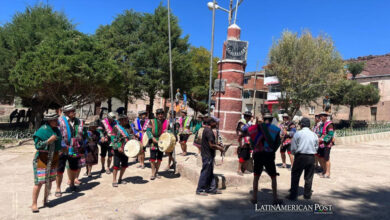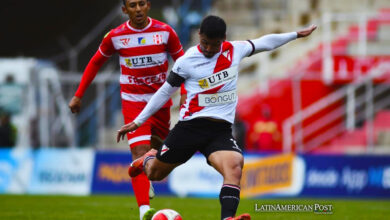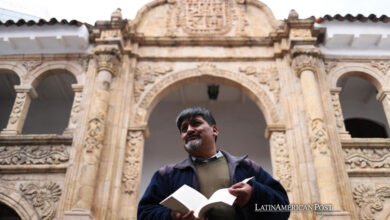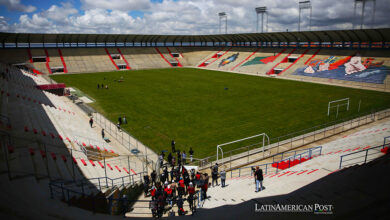The questioned candidacies for the presidency of Bolivia
The names of the candidates for the presidential elections in May begin to sound and they include Evo Morales's designee and the current interim president.

Jeanine Áñez, president of Bolivia. / Photo: Presidency
LatinAmerican Post | Juliana Suárez
Listen to this article
Leer en español: Las cuestionadas candidaturas a la presidencia de Bolivia
Recently, two names have attracted attention in Bolivia for their controversial presidential candidacies. On the one hand Luis Acre, the candidate of the MAS party, of former president Evo Morales, and on the other hand Jeanine Áñez, who declared herself president last November and has fulfilled the functions while the new elections are held.
Both candidates promise to be the main contenders, assuming that the opposition to Morales is able to unite to support a single candidate. However, the name of Carlos Mesa is also among the candidates to hold the position, since he was the man who had the second-highest number of votes in October 2019, when the count that left Morales as winner was declared fraudulent.
The presidential elections of Bolivia will be held on Sunday, May 3, after the elections held in October 2019 were canceled after allegations of fraud. In them, the then president, Evo Morales, was a winner in the first round after the transmission of the vote count was cut when the small difference still did not leave a definitive winner.
Given this, the opposition took to the streets to protest and the Organization of American States (OAS) designated a mission that sought to prove whether there had been any type of fraud. As a result, the OAS determined that there were irregularities in the count and there was partiality of some members of the Supreme Electoral Tribunal (TSE). While this investigation was being carried out, the president resigned his position in what he called a coup d'etat and left the country.
Read also How is corruption perceived in Latin America?
Since that time, Jeanine Áñez, member of the opposition and conservative leader, took over the country and has been responsible for reestablishing some international relations in Bolivia. Meanwhile, she also ruled that there would be presidential elections, but first, there would have to be a restructuring and appointment of new members of the TSE to ensure transparency.
Evo's successor
Since new elections were announced, the MAS party has been looking for a new figure to represent them. The first move of the movement was to designate former president Morales as the campaign leader, he being the main figure and who would continue to play a fundamental role in the new elections.
As a result, Evo Morales's chosen one is now Luis Acre, a former member of his cabinet. Acre was next to Morales during almost all of his presidential terms and his last position was Minister of Commerce.
The announcement, given by Morales himself from Argentina, where he has political asylum, surprised many members and supporters of the party as the candidate appointed by the former president was expected to be Andronico Rodriguez, a coca grower leader who has been seen as his right hand in many occasions.
En conferencia de prensa presentamos a nuestro candidato a la presidencia, hermano Luis Arce Catacora.
Con Lucho y David tenemos una dupla para recuperar la democracia, evitar la confrontación y garantizar el crecimiento económico. pic.twitter.com/Uy8nuLUZAz— Evo Morales Ayma (@evoespueblo) January 27, 2020
At the time of the announcement, Evo Morales said it had been a long debate to determine which of the four pre-candidates would be the official until they decided on Luis Acre. “I had high hopes for Andrónico, but the polls go first and it is not easy to reach agreements with the representatives of each department,” admitted the former Bolivian president.
The main controversy regarding this appointment is the role that Acre played in the last Morales government. Having been a minister and an important figure in the cabinet, he was one of the people who left the country along with Morales when he resigned. Since then, Acre has been isolated in Argentina and on January 28 he said he will return to Bolivia to start his campaign.
Beyond if Arce or Rodriguez or another of the pre-candidates was the designated one, the figure representing MAS party will follow Morales' steps and will have his name in tow, something that the members of that party support but the opposition criticize.
The controversial candidacy of Áñez
One of the first statements of the current interim president, Jeanine Áñez, was to reject rumors that she would run as a presidential candidate once the elections were organized. However, two months later, she announced that she will be a candidate for the presidency.
Querida familia boliviana, he tomado la decisión de presentarme como candidata para las elecciones nacionales. Hemos logrado construir una gran alianza porque queremos continuar con el trabajo que hemos venido realizando. ¡Muchas gracias por todo el apoyo, podemos hacerlo JUNTOS! pic.twitter.com/2dnxDPmlHz
— Jeanine Añez Chavez (@JeanineAnez) January 25, 2020
At the time, Áñez had claimed that she was only in office while she could help normalize the country's political situation, but that she would not use it as a push to gain political power. Therefore, after her announcement, she was criticized by some Morales' followers, as well as by political analysts who claim that she is doing precisely what she had said she was not looking for.
Since Evo Morales resigned from office after some members of the army turned their backs, the former president's followers rejected the actions by cataloging them as a coup d'etat. Now, Áñez's candidacy could be used to support that idea.
In conjunction with this announcement, the self-proclaimed president of Bolivia has called for the resignation of all ministers currently in charge. The announcement, which she gave last Sunday, January 26, referred to a "democratic transition" the government is making to get prepared for the new president.





